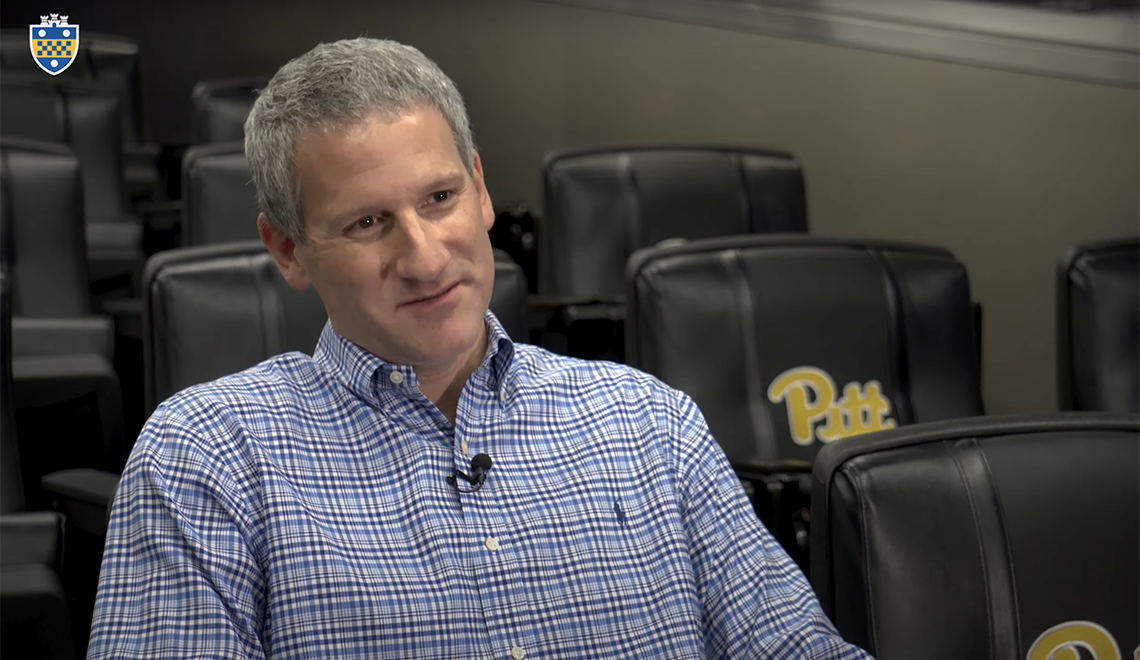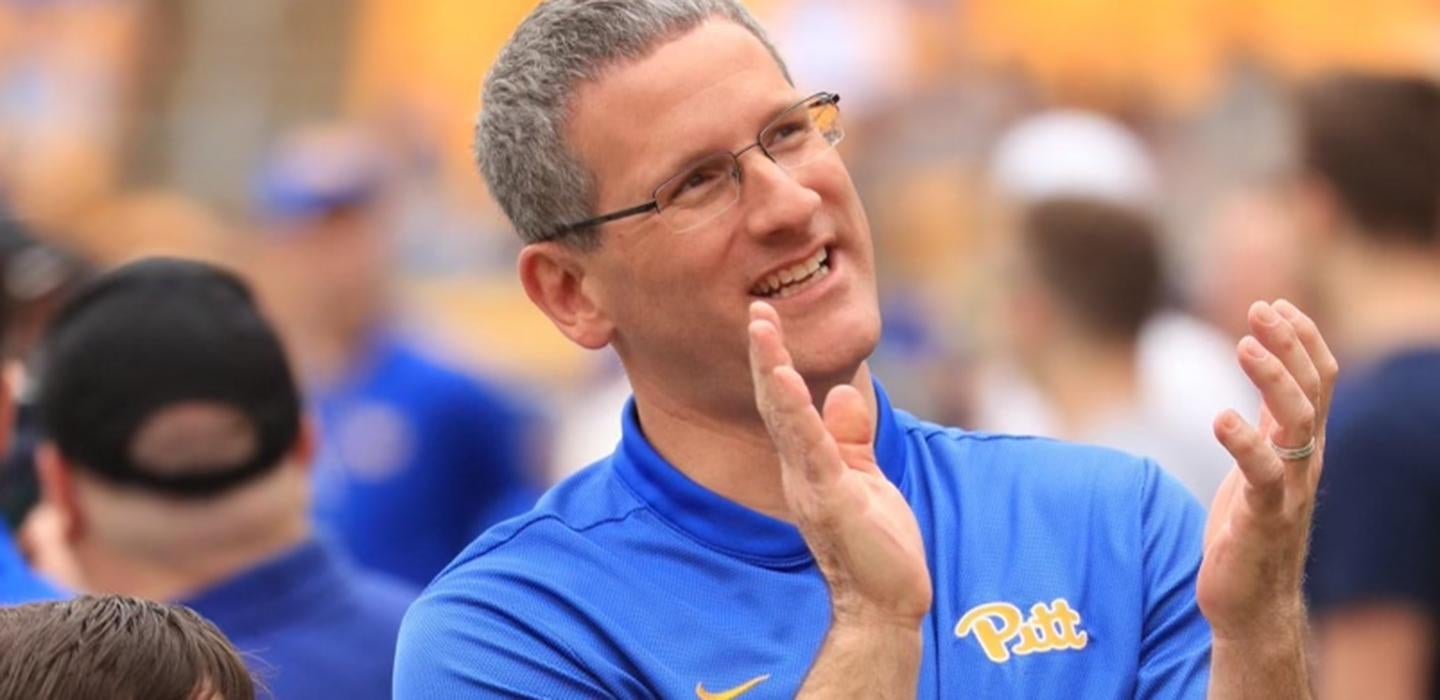
Subscribe to Pittwire Today
Get the most interesting and important stories from the University of Pittsburgh.E.J. Borghetti is blue-and-gold blooded.
“The University of Pittsburgh and, more specifically, Pitt football, is in my DNA,” he says.
His father, Ernie, was an All-American lineman at Pitt almost six decades ago, back when they played both offense and defense. Borghetti was reared in New Castle, Pennsylvania, but raised on Pitt, attending football games at the Pitt Stadium. At the historic 1982 Sugar Bowl, he got an autograph, a Kodak moment and an eyeful of the historic finish from Dan Marino. Later, he became a student-intern at Pitt in what was then Sports Information.
Now, for the past quarter-century, Borghetti has served as media relations leader and one of the longest-tenured members in Pitt Athletics under the title of executive associate athletic director. He is the chronicler of all things Pitt football and the keeper of both the flame and the clipboard used by a predecessor, Beano Cook, who was so esteemed that his obituary appeared in The New York Times. Borghetti’s office walls are adorned with photos of four Pitt men: Tony Dorsett, Hugh Green, Marino and Beano.
In case you weren’t yet convinced, he and his wife, Lauren, named one of their three sons, Conner, after the last pre-Pickett Pitt player to win ACC Player of the Year: James Conner. “The Pitt football family has become my family. That is one of the blessings of this job.”
History. It is at the core of both Borghetti and Pitt football, a 132-year-old program that played four times in the “Granddaddy of Them All,” the Rose Bowl, when it was still a pup between 1928-37. It is a program that gave rise to coach Pop Warner (you may have heard of his youth football leagues across America) and nine national championships, the most recent being 1976. Borghetti was around for that. He also was in the New Orleans Superdome for Marino-to-John Brown toppling defending national-champion Georgia and Herschel Walker on Jan. 1, 1982 — the last time the Pitt Panthers won as many as 10 regular-season games and captured a college football nation’s fancy. Forty years later, Borghetti records Pitt history anew.
Pittwire caught up with Borghetti in the Pitt football facility at the UPMC Rooney Complex in the South Side to wax nostalgic about the program and to celebrate the 2021 team ahead of their appearance in this year’s Peach Bowl on Dec. 30.

Please share your Pitt origin story — how did you get here?
I never had the opportunity to actually wear the blue-and-gold jersey, wear the helmet. But my father did. He got me oriented at a very, very young age. In fact, my very first Pitt football game was the fall of 1976 — October of 1976, to be exact. Pitt was marching to the national championship that year with [Coach] John Majors, and Mr. Tony Dorsett was evading tacklers everywhere en route to the Heisman Trophy. That was my first introduction to Pitt football at the tender age of 6, and it has been a part of my life for 45 years and counting.
Tell us more about your dad.
My father concluded [his Panthers career] with a very memorable and historic year in 1963, famously — or infamously — known as the 9-1, No-Bowl Team. My father was Ernie Borghetti, a two-way tackle. He never left the field in those days. He was an outstanding player; he may not say it, but every day I walk down the hallways of the Pitt football facility, and there are images of first-team All-Americans who played for the Panthers. And I’m proud to say my father was a first-team All-American tackle in 1963. He still takes great, great pride of his time at the University. It’s something he handed off to me. And it’s something I’ll hand off to my three boys as well.
Given your Pitt perspective and history, why is this season so meaningful?
Pitt football has a long history. A very storied history. However, there were only four teams that have won 11 games or more in a season. We had the undefeated, 12-0 national championship team in 1976. We had the three 11-1 teams from 1979 to 1981. [Then, no double-digit regular seasons for 40 years.] That streak is broken. We’re looking at No. 5 [in 11-2 Pitt of 2021].
This is a very, very special team. I think that’s why the national spotlight, certainly the region, has embraced this team. What I love about this team is: It’s hard-working. It earned 11 wins. It earned our first-ever outright Atlantic Coast Conference championship.
Pitt for many years played as an Independent; they didn’t play in a conference. During our years as a Big East member, from 1993 to 2012, we won just two titles — and they were shared. We were co-champions. So, this is the first time we can call ourselves the outright champion of a conference. And not just any conference, but one of the most prestigious, competitive conferences in all the land, the Atlantic Coast Conference.
How did the pandemic affect this year’s team?
I think this year’s Pitt football team has leadership up and down, from our freshman class all the way through to our senior class to our super-senior class [allowed an extra season due to COVID-19, such as quarterback Kenny Pickett]. I have no doubt that the challenges and some of the adversities of 2020 absolutely and positively served as a springboard to all the achievements of 2021. Some people thought that the conference championship would have come last year. It didn’t. But rather than let that disappointment sink the squad, or sink the locker room, they built off it. I think it strengthened our leadership. I think it strengthened our resolve.
If you look back at No. 8, Kenny Pickett: Kenny learned through that year, persisted through that year, had a decision to make. And he decided to come back. He didn’t come back to be an All-American. He didn’t come back to be a Heisman finalist. He didn’t come back to be a Johnny Unitas Golden Arm Award winner. Even though all those things happened. He came back to win a championship — that was his sole focus. The whole team had high expectations. In some respects, they even surpassed their expectations with what they did.
Explain the importance of a Chick-fil-A Peach Bowl berth, Dec. 30, against Michigan State.
When college football bowls are discussed, inevitably — and certainly among national media circles — it’s, “Well, there are too many bowls.” And there are a lot of bowls. But the elite bowls, in addition to the college playoffs, are the bowls described as the ‘New Year’s Six.’ [Rose, Orange, Cotton, Fiesta, Sugar and, yes, Peach.] By winning the ACC championship, the reward is to play in a ‘New Year’s Six’ bowl. This team earned it.
This interview has been edited for length and clarity.
— Chuck Finder


